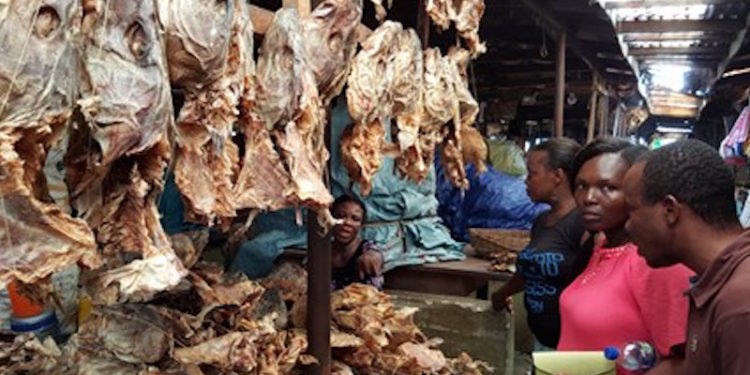When the price of oil dropped significantly in Nigeria in 2016, Faroe Marine Products was forced to discontinue its production of fermented fish heads. Today, an increase in oil prices in Nigeria has put the company back on track.
Faroe Marine Products buys by-products such as the heads and backbones of fish from other Faroese fish producers. These by-products, are hung to dry and ferment for 14 days. Some of the by-products, such as blue whiting, are exported to Germany and England and sold as high-quality pet food.
Other by-products, like fermented fish-heads and backbones, are exported to Nigeria where they are considered a delicacy, eaten on special occasions. The dried fish-heads and backbones are boiled for five to six hours, giving soups a unique, fermented taste. A fermented fish head is sold for between one to two US$ at markets in Nigeria.
Faroe Marine Products started life as a joint-venture company with the Icelandic UA fish processing plant in 2001.
Eirikur á Húsamørk, who has long experience of working in the fishing industry, is the founder and owner of Faroe Marine Products
‘The whole idea behind this is make good use of something that otherwise has no value and is being thrown away,’ he said.
The company, which employs nearly 50 people, buys approximately 10-15,000 tonnes of by-product a year and exports approximately 3000 tonnes. It takes around six weeks for products to be shipped from the Faroe Islands to Nigeria, which has a population of 180 million – which means 180 million potential customers.
‘It’s a massive market for us, but it also means our company is largely dependent on Nigeria’s economy,’ Eirikur á Húsamørk said.
Aware of the effects of being so dependent on one main export market, he and his team are currently looking at expanding into new and untapped international markets.
‘The people of Nigeria love the fermented taste of the fish-heads and backbones,” he said. ‘I’ve tried their excellent fermented soup, which includes bitter leaves, chili and pepper and is eaten with pounded yam, but I needed something to wash it down with because it was so spicy.’
Dried and fermented fish have played an important role in the diet of Faroe Islanders for centuries. They have been an essential source of protein on the islands, where harsh weather conditions affect the availability of food. Every piece of every fish caught was and continues to be used. Fermentation was one of the few means of conserving fish and meat. Today, the dish, which is said to possess a sharp, ripe, almost repugnant taste, is not only a source of food, but also plays an important role in the gastronomy and identity of the Faroese.









